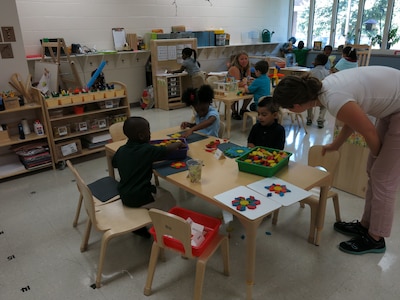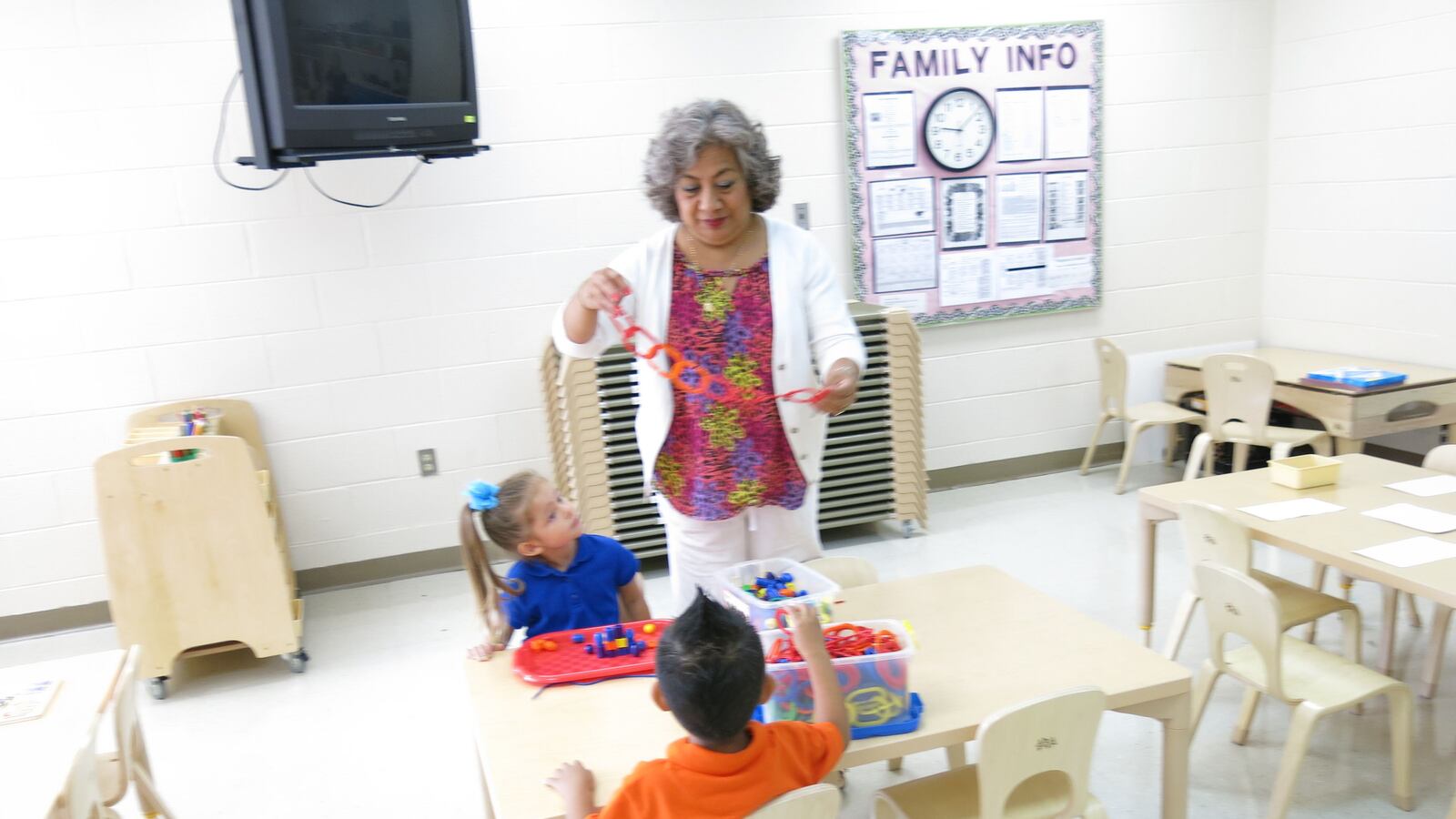About 40 four-year-olds bounded from a school bus into an East Nashville prekindergarten center on its opening day in August. Their parents, who had ridden with them, followed close behind, holding up iPhones and video recorders.
The parents were documenting not only first day of school for their children, but the beginning stages of an ambitious pre-kindergarten initiative that district leaders hope will serve as a model for early education in Nashville.
Both of Tennessee’s largest school districts, in Nashville and Memphis, are not only pushing to expand pre-K, but to also make it more effective. Shelby County Schools says it plans to use more standards and increase accountability in a group of Head Start early learning classes it took over, and Metro Nashville Public Schools just opened three “model centers”—including the one the students were bounding into in August—where it will host cutting-edged early learning practices with help from researchers at Vanderbilt University’s Peabody College of Education.
More high-quality, accessible pre-K, advocates argue, will reduce the achievement gap between affluent and economically disadvantaged students and boost college and career readiness down the line. “I would love for Nashville to be a model, where federal funding flowed in to offer pre-K on a wider scale,” said Metro Nashville Public Schools director Jesse Register.
But the districts’ expansion comes without state support. According to a spokesman, Gov. Bill Haslam, a Republican, will not increase spending on pre-kindergarten until a Vanderbilt study on the efficacy of the state’s program concludes next year— even if that increase were supported with federal, rather than state, funds. A comptroller’s report three years ago suggested that Tennessee’s current pre-kindergarten program wasn’t boosting achievement throughout elementary school.
Early expansion before a pause
A decade ago, Tennessee’s legislature passed the Voluntary Pre-K (VPK) for Tennessee Act of 2005, which successfully increased access to pre-K programs for low-income children. In 2004-2005, only 3,000 Tennessee four-year-olds attended a public pre-kindergarten other than Head Start; in 2013-2014, 18,000 did. Seats in the program are filled through a lottery, with low-income children and children with disabilities receiving priority. The state spent more than $85,000,000 on the VPK program in the 2013-14 school year.
Now, despite a big push on pre-K from the Obama administration and bipartisan support for its expansion in other states, Haslam says he is waiting for more data before expanding Tennessee’s program again.
Tennessee was one of 35 states eligible for one of 10 pre-K expansion grants from the U.S. Department of Education to be awarded this December, which could be from between $10 million to $35 million (the final award would be based on population), but the state did not apply for the grant. Metro Schools sought to apply directly for federal dollars but was declined.
Even if the new Vanderbilt study convinces officials to expand state spending, the legislature would still have to approve any increases. Local districts likely wouldn’t see the money until at least 2016, said Betty Anderson, the director of Stand For Children in Tennessee.
District and city leaders in both Memphis and Nashville have turned to alternate routes for funding. Twice, a movement to raise the sales tax in Shelby County to create more prekindergarten seats has been put on the ballot, and twice it has failed. The county’s commission set aside $3 million for new classes earlier this summer.
Nashville prekindergarten advocates have been more successful. The Metropolitan Nashville Public Schools added more than 300 prekindergarten seats this year with more than $27 million set aside by the city, and aims to have universal pre-K within the next four years.
Research on efficacy, improvement
The state comptroller’s 2011 report recommended the state continue its expansion of pre-K, as it seemed to better prepare low-income students for kindergarten. But the research committee stated in their final report, they didn’t have enough evidence to show that the pre-K gains were sustained after kindergarten.
The researchers noted that much of the lack of evidence was because of limited funds and test scores available for the children studied. But a group of Republican legislators, led by a representative from Knoxville named Bill Dunn, championed the report as proof that pre-K was a bad investment for the state of Tennessee.
Dale Farran, an early education researcher at Vanderbilt, is working with Metro Schools on its model centers. She’s also the head of the study on Tennessee’s current pre-K program whose results Haslam is awaiting. She says that policymakers should look at what makes pre-K programs effective, and be careful not base decisions about whether to expand programs based on ineffective pre-kindergartens.
Farran points out that many of the pre-K classes she and her team studied were not ideal, so making decisions about the potential efficacy of pre-K based on the program as currently implemented might be premature. For example, she has found that many classes in the voluntary pre-K program spend more than an hour a day in whole-group instruction, which researchers at Vanderbilt and other institutions have found impedes young children’s learning.“We didn’t just want pre-K for the sake of pre-K,” Farran said. “We wanted to reduce the achievement gap and prepare kids for school. Pre-K is a mechanism to get there. If it’s not doing what we need it to, we should be saying, ‘what can we do to make it better?’”
Farran said so far, findings show that the difference in academic gains for those who attended state-funded pre-Ks compared to children who did not level off by the 1st grade. She said students who attended pre-K could possibly show better mastery of other skills, like paying attention and controlling how hard they work, that might last longer.
The National Institutes of Health is funding the research team at Vanderbilt to continue to follow a group of Tennessee students who attended pre-K into middle school.A model for prekindergartenNashville superintendent Jesse Register said the three new model centers, which will serve 350 students this year, will help improve the quality of pre-K throughout the district. “Our program prior to this year was in 57 sites, and we knew we had a lot of variation in quality from site-to-site,” Register said.
The leaders of the new model centers, currently housed at the former Ross and Bordeaux elementary buildings, are working with researchers from Vanderbilt, including Farran, to make sure the centers are at the cutting-edge of pre-K practices.
“We want the model centers to be something that we can use as a district to benchmark quality…in terms of programming, curriculum, teaching practices, and how much support pre-K teachers get,” said Lisa Wiltshire, the director of early education in the district.
On a recent day in a classroom at Ross Elementary, some students were played blocks while others played house and drew.

The teacher, Ms. Jessica, floated around the room to ask students questions about what they were doing, but was careful not to tell them what to do. Students at the model centers much of their day in self-directed play in centers. The center is using a program called the Creative Curriculum, which emphasizes playing as a way to learn.
“You want them to be making connections and seeing how things relate to each other,” Farran explained. ‘You have to have those things in that environment that engage their interest.”
One little boy was vigorously using a real mop to pretend to clean up. His classmate pointed at him. “This is what kids do!” he said.


